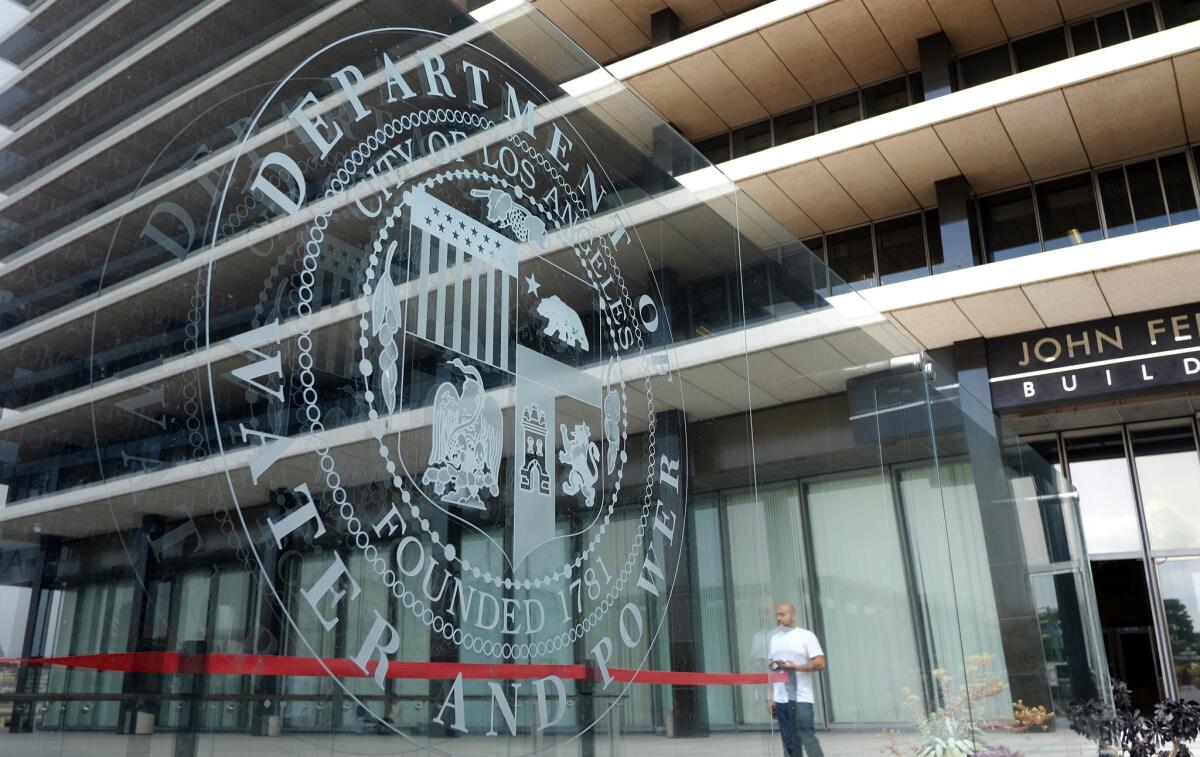DWP trusts paid for steak dinners, trips to Hawaii, Las Vegas, audits find

Two nonprofit trusts created by the Los Angeles Department of Water and Power and financed with more than $40 million from ratepayers paid millions to vendors without competitive bids, overpaid top managers and let them charge personal travel, gasoline and other items without filing expense reports, city audits released Thursday showed.
In five years, a handful of trust employees charged more than $660,000 to their publicly financed credit cards for things such as steak dinners and trips to Las Vegas, Hawaii and New Orleans, City Controller Ron Galperin said.
However, Galperin said, auditors did not find evidence of criminal wrongdoing.
One top administrator, who was making about $220,000 a year, used his trust-issued card for more than $30,000 worth of gas between 2010 and 2014, city auditors found.
The release of the audits ended a more than year-long political and legal battle waged against the city by the nonprofitsâ top administrators â particularly Brian DâArcy, head of the city-owned utilityâs largest employeesâ union â to keep detailed spending records secret.
After blasting the administrators for âcavalierâ spending of public money, Galperin called publication of the audit a victory for transparency. âWe were fought tooth and nail on this, and we won,â Galperin said.
The records, including thousands of credit card charges, will be posted on the controllerâs website.
In a written response Thursday, DâArcy said Galperinâs audit was âlittered with accusatory innuendo and peppered with contradictory statements.â It also failed, he said, to prove that money was spent on anything other than âimproving safety and training of the hard-working employees of the DWPâ â or that the nonprofits had âviolated any laws or regulations.â
While most of the nonprofitsâ dozen or so trustees, administrators and employees agreed to be interviewed by the auditors, DâArcy did not, according to the report.
The nonprofits â which receive roughly $4 million annually in funding from the city â were created in the early 2000s to promote safety and training at the utility. According to a separate
report by City Administrative Officer Miguel Santana, which was also released Thursday, they failed to
provide any âreal information on the outcomes or effectivenessâ of their programs.
DWP officials have said they spend more than $117million a year on safety and training programs, dwarfing the amount paid to the nonprofits.
The Joint Training Institute and the Joint Safety Institute, as the nonprofits are known, are administered by DWP managers and leaders of the utilityâs largest employeesâ union.
They became a thorny political issue for Mayor Eric Garcetti and the City Council in September 2013, after The Times reported that officials could provide almost no information on how the groups had been spending ratepayersâ money.
The audits are the first public accounting of that spending.
Galperinâs review found the nonprofits have essentially been accumulating cash, with more than $11 million in savings.
In interviews with The Times last year, former nonprofit administrators said management and labor sides often struggled to find projects they could agree to spend money on.
âIf theyâre not spending this money, you have to wonder why we keep giving it to them,â Galperin said. He said he would propose withholding future annual payments until the savings have been spent.
Last year, Galperin refused to make the cityâs scheduled $3.8-million transfer until the nonprofits allowed his auditors access to the books.
The reviews also found the nonprofits had paid $6.1million to outside vendors and that the majority of those contracts were written âwithout any competitive or documented process to ensure reasonable price or value was received.â
Five top administrators currently make about $220,000 each, Galperinâs audit shows. By comparison, employees at the state Public Utilities Commission, who have roughly equivalent jobs, make about $148,000, the auditors found.
Consolidating the nonprofits into one organization and eliminating two of the top positions could save the city nearly $740,000 a year in salary and other expenses, the auditors said.
Other findings include a âtransportation allowanceâ of $500 a month for the top administrators, in addition to being able to use trust-
issued credit cards for gas and car washes.
The use of those credit cards, which had averaged more than $150,000 in the three previous years, dropped to just over $31,000 in 2014 after The Times report sparked a debate between elected officials and union leaders over transparency of the nonprofits, auditors said.
In his statement, DâArcy said the spending fell because, amid the controversy, the nonprofitsâ boards could not muster a quorum to approve payments.
Perhaps the most telling example of the suspicion that has built up around the trusts â originally created to improve labor-management relations at the utility â was the reason administrators gave for using public funds to buy themselves iPads and cellphones.
They needed to have âa secure communications channelâ outside devices provided by the DWP, according to the controllerâs audit.
âThey are used to operating out of public view, and thatâs how they like it,â Galperin said. âTransparency is not their favorite word.â
Follow @jackdolanLAT for more news from L.A. City Hall.
More to Read
Sign up for Essential California
The most important California stories and recommendations in your inbox every morning.
You may occasionally receive promotional content from the Los Angeles Times.











